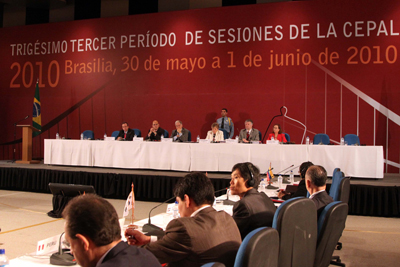"More Democracy with More Equality, Two Sides of the Same Coin in Politics and Development"
Topic(s)
The State should ensure the participation of the most excluded in the fruits of growth, said ECLAC Executive Secretary Alicia Bárcena.

(Brasilia, 30 May 2010) "In terms of social equality, the State should ensure that popular will is expressed in agreements that provide political legitimacy and ensure the application of medium- and long-term policies," stated Alicia Bárcena, Executive Secretary of the Economic Commission for Latin America and the Caribbean (ECLAC) during the inauguration today of the Commission's Thirty-third session in Brasilia, capital of Brazil.
In her inaugural speech, Bárcena highlighted the role of the State in promoting strategic agendas that reflect the deliberations of a broad range of stakeholders. "As regards equality, the State must focus on increasing the participation of the excluded and vulnerable sectors in the fruits of growth. For this purpose, the full exercise of rights and of a public voice is the link between political action and social equality," she stated.
Representatives of ECLAC's 44 member States and nine associate States attending the session will discuss the region's economic, social and environmental development, examine the activities of the Commission during the preceding biennium and set the priorities of its programme of work for the following two years.
On behalf of the Government of Brazil, Ambassador Pedro Carneiro de Mendonça, Undersecretary General of Economic and Technological Affairs of the Ministry of Foreign Affairs, officially inaugurated the Thirty-third session of ECLAC.
"The definition of the main theme of this session of ECLAC - equality - is extraordinarily important for all of us who would like to see a region that is more politically democratic, socially fair and economically strong," he said.
The Executive Secretary of ECLAC stressed that today is the time for equality and gaps must be closed and trails opened for the region's citizens not only to have the right to a better future, but to finally win the right to a better present.
Bárcena outlined the pillars of equality: equal rights, the establishment of a fiscal covenant, a democratic order and economic policies implemented with a long-term vision of production, labour, and social and territorial development.
- Equality of rights, which provides the framework and basis for regulating social covenants that generate greater opportunities for those who have less.
- A fiscal covenant that envisages tax structures and tax burdens with a greater redistributive effect and can strengthen the role of the State and public policy to ensure that the well-being threshold is respected, together with labour institutions that protect job security
- A democratic order in which the course of development reflects the will of the majority and enables all stakeholders to participate.
- A set of economic policies implemented with a long-term vision of production, labour, and social and territorial development that seeks not only equal opportunities, but also concrete achievements in terms of narrowing existing gaps.
"Social equality and economic growth are not opposing goals; the challenge is to find the synergies between them. What we propose points towards this: growing to equalize and equalizing to grow. Within our long-term strategy, equality, economic growth and environmental sustainability must go hand in hand," said Bárcena.
The Thirty-third Session of ECLAC will continue today with a meeting of the Committee on South-South Cooperation. A ceremony will be held in the evening to commemorate the 50 years since the ECLAC office was established in Brazil.
As part of the commemoration, a special Portuguese-language issue of CEPAL Review will be launched. The issue contains a selection of 15 featured articles published over the past five years, including several by Brazilian authors.
See also: Presentation ECLAC Executive Secretary Alicia Bárcena (in Spanish)
More information on the Thirty-third session of ECLAC is available on the webpage.
For enquiries and interviews, please contact Cláudio Tourinho, of CDN Comunicación Corporativa, tourinho@cdn.com.br; telephones: (61) 3704-7660; (61) 8117-7313, or ECLAC's Public Information and Web Services Section, dpisantiago@cepal.org; telephones: (56-2) 210-2040/2149. Mobile phones: (56 9) 88390573, (56-9) 7967-8306, (56-9) 8839-0576.
Contact
Public Information Unit
- prensa@cepal.org
- (56 2) 2210 2040